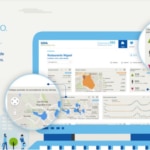Big data - a term that may sound a bit ominous and which many have used for years without properly explaining it - has many more practical applications than one could imagine. Maybe it is just because it sounds a bit like big brother, but unlike it, big data applications are being developed with more than positive purposes in a broad range of fields of activity. In this article we discuss some of them, offering some examples of how society can benefit by analyzing the enormous amount of data we generate every day.

Let’s start by addressing one key question: what exactly is big data? Big data makes reference to the set of data-based processes, technologies and business models that focus on realizing the potential value that these data these data bring. Big data offers efficiency improvements through data analysis, as well as the possibility to create new services and business models to drive growth.
In the current digital environment in which we live, almost any activity we engage in, leaves a digital trace: Buying a pair of pants, refueling at the gas station, sending a whatsapp, shopping online… thus, without barely realizing it, we generate a huge amount of information that, properly managed, can make our lives much easier.
One of the key points in digital transformation is the smart use of information. This is true in all companies, large or small, that successfully operate in the context of an economy that has a total and permanent reflection in the digital sphere, sometimes even beyond it. BBVA is leveraging advanced data analytic capabilities integrated in its different business areas to drive its transformation.
Traditionally, large companies record enormous amounts of data that were just wasted without contributing any further value because they were not analyzed. That is why BBVA created BBVA Data & Analytics, the Group’s center of excellence for data analysis: to develop professional and scientific competences, similar to those that the most successful native digital companies already have, and which lie at the core of industry transformation processes. The department focuses on fields such as customer insight, fraud detection and prevention, risk analysis and, in general, improving internal processes and developing better services for customers. For years, BBVA has been striving to improve its financial service offering and develop new products.

But big data can also offer a great help to small businesses and SMEs through Commerce360, a new system aimed at providing them with Artificial Intelligence through the analysis of transactional data from POS terminals and credit cards (always in an anonymized, statistical and aggregate manner, to guarantee customer privacy). This service is designed to help merchants improve the way in which they run their businesses and boost satisfaction offering differential services. Commerce360 provides relevant information to help stores decide on a number of key aspects, including business hours, opening new stores, segmentation of commercial offering (by zone, day, customer segments), marketing campaigns, cross-selling initiatives with other businesses, etc.
BBVA Data & Analytics is analyzing data to help understand the economic impact of different events and to offer support to decision making processes within institutions and businesses. “By studying data we can provide public administrations, private businesses and customers, in short, with valuable information that will help them with present and future decision making processes. This way we are democratizing capabilities and knowledge that until now only very few players had access to,” explains Elena Alfaro, CEO of BBVA Data & Analytics.
Indeed, the company has carried out studies with the Madrid City Council, analyzing tourism and tourist behavior and spending habits; in Barcelona, during the Mobile World Congress and with the Study of Tourism in Spain, published in August 2015.
These are only some instances of what big data can offer. The key lies in extracting knowledge of all the data that businesses generate. In the case of BBVA, the Data & Analytics area centralizes knowledge in data science and advanced analytics to turn all these data into better services and products for customers, and in general, for society.